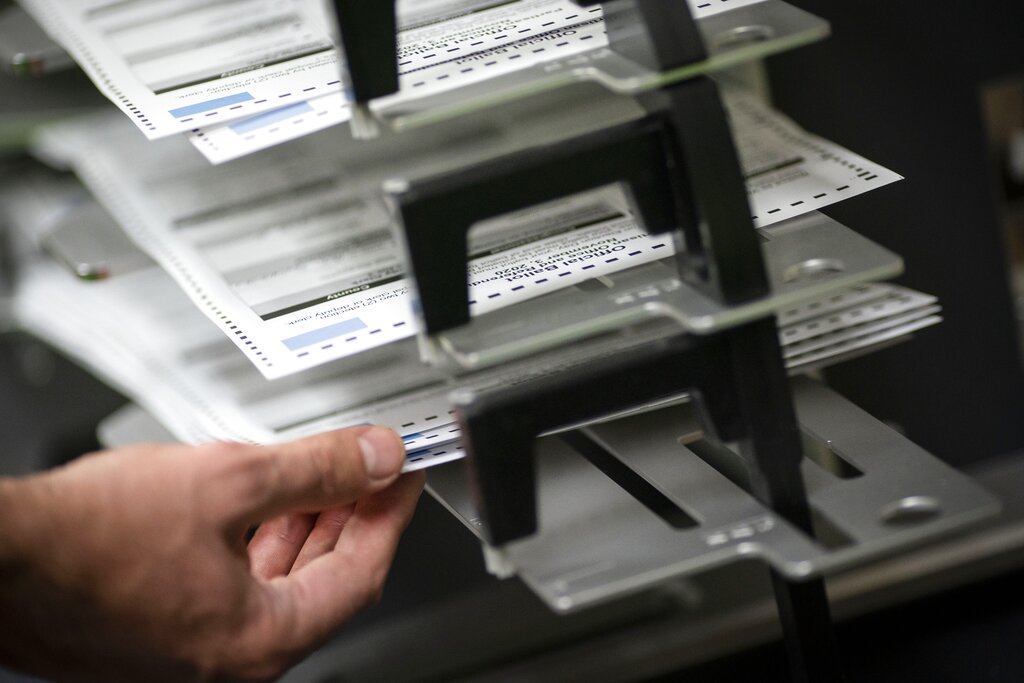A new lawsuit seeks to allow Wisconsin voters with disabilities to vote electronically. The lawsuit argues that voters with disabilities who need help reading or marking their ballot are deprived of the constitutional guarantee of a secret ballot.
Deployed military members and those living overseas can vote by mail or online in Wisconsin elections, and the lawsuit asks the court to allow them to do the same for voters with disabilities, in order to comply with state and federal laws that guarantee equal access and accommodation.
The Wisconsin Disability Rights Association and the League of Women Voters of Wisconsin filed the lawsuit Monday in Dane County Court against the Wisconsin Elections Commission.
Get the latest news
Sign up for WPR’s email newsletter.
“Wisconsin law currently makes no exceptions for voters with disabilities, who are treated unequally and face real and significant obstacles to participating in absentee voting,” the lawsuit states. “Instead, Wisconsin law requires that all mail-in absentee voters, other than those in the military or overseas, receive a ballot in the mail, hand-mark the ballot, and return it by mail or deliver it in person.”
“Any one of these measures could make paper ballots inaccessible to voters with disabilities, particularly those who have reading and writing difficulties,” the lawsuit states.
Four disabled people have also joined the suit: two are blind and two can read the ballot but “lack sufficient hand dexterity to mark it,” according to the lawsuit.
But the plaintiffs argue that electronic ballots can be completed with most home accessibility devices, including electronic screen readers.
“Voters who, due to a disability, are unable to vote absentee without accessibility devices are given a choice that non-disabled people do not have – either forgo absentee voting or waive their constitutional right to a secret ballot,” the lawsuit argues.
Kit Kirschensteiner, director of legal and advocacy services for the Wisconsin Disability Rights Association, said the case is about everyone having equal voting rights.
“This is about the right that we all have as citizens to vote in a private and independent way,” Kirschensteiner said.
According to the lawsuit, local governments in Wisconsin distributed electronic absentee ballots to anyone who wanted one until a 2011 law limited that option to only deployed military members and those permanently overseas.
A federal judge found the law violated the First and Fourteenth Amendments to the Constitution, but the decision was overturned on appeal. The lawsuit argues that the ruling “failed to specifically address the unequal treatment and burdens faced by Wisconsin voters with disabilities.”
The lawsuit argues that other states allow access to electronic voting and that Wisconsin “already has the building blocks of such a program in place” for overseas voters.
“Thirteen other states have already done this,” Debra Kronmiller, executive director of the League of Women Voters of Wisconsin, told WPR. “This is not a new idea for Wisconsin. This is about guaranteeing constitutional rights for everyone.”
Kronmiller said both groups that filed the lawsuit have been part of the Disability Voting Coalition for many years and that the WEC has been aware of these issues for many years.
In 2022, the commission resolved to tell local clerks that they must allow voters with disabilities to ask others for help returning their absentee ballots.
Absentee voting has been a contentious issue in the state, where four of the last six presidential elections have been decided by less than 1 percentage point, and the Wisconsin Supreme Court is reviewing a ruling that restricted the use of absentee ballot drop boxes.
According to the Centers for Disease Control and Prevention, people with disabilities make up about 23 percent of Wisconsin’s population.
The Election Commission declined to comment on the matter.
Wisconsin Public Radio, © Copyright 2024, University of Wisconsin System Board of Regents and Wisconsin Educational Communications Commission.

